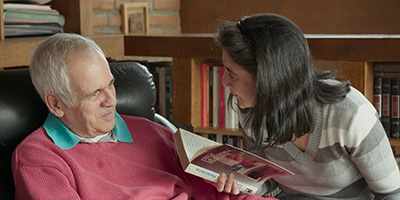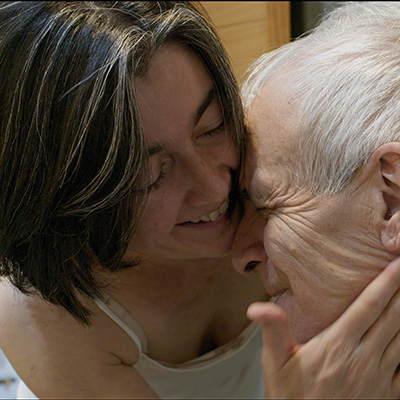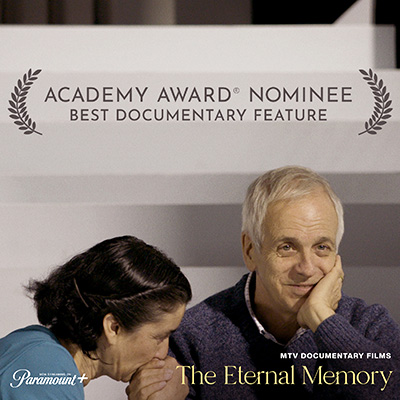
Fight Alzheimer’s Into 2026 and Beyond
Fight Alzheimer’s Into 2026 and Beyond
Don’t miss your chance to make a generous gift to our 2026 Annual Fund Drive to help fund essential care and support and advance critical Alzheimer’s research.
Give Monthly“The Eternal Memory” Documents Love Story that Prevails in the Face of Alzheimer’s Disease
“The Eternal Memory” is nominated for an Academy Award for Best Documentary Feature Film this year. The film tells the story of a Chilean couple — journalist Augusto Góngora and actress Paulina Urrutia — whose two-decade marriage prevails when Augusto is diagnosed with Alzheimer’s disease. We spoke with Paulina about documenting her love story and life with Augusto, who died of Alzheimer’s disease in 2023.
Paulina, how did you and Augusto first meet?
We met in 1996. Augusto came to the theater of the play I was acting in. He knew the director and he wanted to meet me. I couldn’t believe it. When he told me it was true, I said, “Oh, how ridiculous!” The next day, he called my colleague to ask for my phone number. And the next day he called me on the phone. That’s how it began.
You and Augusto were together for more than 25 years. What were some of the first signs or symptoms that you noticed in Augusto?
He was totally active. He had a job, was developing a new project for Chilean public television, where he was a member of the board of directors. The first thing that began to fail was his capacity to retain things.
a new project for Chilean public television, where he was a member of the board of directors. The first thing that began to fail was his capacity to retain things.
He would be planning meetings or tasks that he had to do the next day, and would get to work and say, “Hey, we've got the meeting,” but then ask what the meeting was about, or if they already had the meeting.
Another example was when he was teaching at the University. He called and told me that someone had stolen his car. So, I went to the University and we walked all around in a two-block radius looking for the car, but we didn't find it. Two months later, the Chilean police called me because they found the car. When they gave me the address, it was three blocks from the University. The car had been there for two months, parked in the same place where Augusto left it. To me, that experience was key. To me, that experience was key. He never said, "Wow, I left the car there." That was when we decided to go to the doctor.
The documentary offers an intimate look at the daily experience caring for someone with Alzheimer’s disease. What was the experience of being Augusto’s primary caregiver like for you?
In life, there are difficult things and beautiful things. Being a caregiver for someone is both of those.
There are a lot of compromises and sacrifices when you become the primary caregiver for your loved one. There are costs — financially, emotionally, physically — but also benefits when faced with this decision. For me, I knew it was inside of me. I assumed all the costs, and I assumed all that was to be discovered. And, I discovered some incredible things. I did not see myself as only a “caregiver,” but as an adult woman who became a “care partner” for someone I love.
As you see in the documentary, sometimes Augusto had to come to work with me because I had to continue to be the one who supported and sustained us. I hired someone to help me at select times and because there were some care needs that required two people. The rest of the time, it was just me and Augusto. While it had its difficulties, I also enjoyed the time it allowed us to spend together.
This disease is an individual family responsibility and also a social responsibility. There are many who can not easily include their loved ones in their work, like I included Augusto. This disease strongly affects the economic life and the health of the caregivers. There needs to be relief and the necessary tools to help people face difficult moments.. It is mostly women who are caring for children or assume the responsibility of carers, and it took women a long time — too long — to be accepted as more than just mothers, but as people who can play a role in politics and society as well. Caring is a part of our identity, not all of it.
The documentary is a beautiful look at your love story and how love can prevail even in some of life’s darker moments. How did you and Augusto show your love on Valentine’s Day, and every day?
The most beautiful part of our story is that we discovered unconditional love for one another. It exists when you are vulnerable and precarious, in your bad days and your good ones. To have someone with you in those moments is the most incredible thing. I felt that with Augusto.
It's not only wonderful to feel that somebody can support you, but the feeling you get when you support somebody else. You realize that your life has meaning. Sometimes we can live an enclosed life, living for ourselves. But, reaching out your hand for someone else, can provide you a sense of life.
What advice would you give to others who are dealing with similar situations?
People hear the diagnosis and get very afraid and think about all of the difficulties. I’m not saying not to be afraid — but also, go discovering. There is so much to learn.
It is important to try to balance your emotions. This disease requires emotional management. If you begin to suffer, to get angry, to feel impotent and don't face it, you, too, will end up sick. On the other hand, if you manage to balance the hard moments with moments of relief and laughter and take things with tenderness and affection and dedication, you can survive this.
Perhaps the most important advice is to understand that this is a decision and you can always change your mind. If you realize that you are not able to cope, be honest with yourself and look for an alternative. You have to be honest with yourself, and not run away from the problem.
What lessons have you taken away from your husband’s battle with Alzheimer’s?
Alzheimer’s is a degenerative disease. There is no cure. How I faced this disease is by education and acceptance. We all will go through difficult experiences in our lives and while this journey was difficult, being there for Augusto and holding his hand through it together was deeply meaningful.
Both you and Augusto had careers as storytellers — you as an actress and Augusto as a journalist. Why was it important for you to tell your experience with Alzheimer’s through this documentary?
 The decision to participate in the documentary was Augusto’s and it was a conscious decision early on in his diagnosis. When he disclosed in one of the main newspapers in Chile that he was diagnosed with Alzheimer’s disease, he was greeted with a tremendous response of respect. He became a public figure in the campaign to face Alzheimer’s disease and advocate for better policies.
The decision to participate in the documentary was Augusto’s and it was a conscious decision early on in his diagnosis. When he disclosed in one of the main newspapers in Chile that he was diagnosed with Alzheimer’s disease, he was greeted with a tremendous response of respect. He became a public figure in the campaign to face Alzheimer’s disease and advocate for better policies.
Maite Alberdi (director of “The Eternal Memory”) had a vision to tell our love story in the midst of Augusto’s Alzheimer’s. I couldn’t see how it would come together but creators see things. When you are living through difficult things and are able to share them with others, it can be deeply meaningful.
“The Eternal Memory” is a beautiful work of art. That’s what Maite and Augusto created together. I see now that it has transformed the hearts and minds of people. That is a marvel.
If the film can help anyone recognize that like any difficulty in life, we can overcome it, that is what it means to be alive.
All photos courtesy of MTV Documentary Films.
Related Articles
10 Early Signs and Symptoms of Alzheimer's and Dementia
24/7 Helpline
Caregiving
Hispanics and Alzheimer’s

The first survivor of Alzheimer's is out there, but we won't get there without you.
Donate Now
Learn how Alzheimer’s disease affects the brain.
Take the Brain Tour
